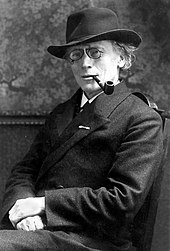Bjarnat Krawc
Bjarnat Krawc , German Bernhard Schneider , also known the doubling of the surname as Krawc-Schneider , (* February 5, 1861 in Milstrich , Sorb. Jitro, Kr. Kamenz ; † November 25, 1948 in Varnsdorf , Czechoslovakia ) was a Sorbian composer , Choir conductor , music teacher , publisher of music literature and honorary citizen of Varnsdorf.
Life
In 1882, Krawc passed his exams at the Bautzen teachers' college, but after a short period as a teacher, he moved to Dresden in 1883, where he studied composition with Felix Draeseke at the Royal Saxon Conservatory . He was leader of various choirs in Dresden. In 1918, Krawc was appointed Royal Saxon Music Director. In 1922 he founded the Association of Sorbian Choral Societies. In 1926/28 he was editor of the first Sorbian music newspaper. The founding of a Sorbian symphony orchestra, which Krawc endeavored to establish, did not materialize for financial reasons. In 1931 he was appointed a member of the Czech Academy of Science in Prague. The National Socialists forbade the performance of his works, and from 1937 on, Krawc was subjected to various reprisals. He died in Varnsdorf , a small Czech town on the border with Upper Lusatia , which had previously given him honorary citizenship.
His daughter Hanka Krawcec (Hannah Schneider, 1901–1990) created the design for the Domowina symbol .
Works (selection)
Instrumental music
- “Ze serbskeje zemje” (From the Sorbian Country), Suite, 1894
- “Dopomnjeća raj” (Memory), Symphonic Intermezzo, 1925
- Three Sorbian Dances, 1931/34
- Six Sorbian Dances, 1931/34
Chamber music
- String quartet in C minor, 1893
- Sorbian Rhapsody for violin and piano, 1921
- Miniatures for violin and piano, 1929
- Burleska for violoncello and piano, 1933
- Small chamber septets, 1933
- “Ze serbskeje hole” (From the Sorbian Heath), 14 pieces for string quartet, 1934
Piano music
- "Ze serbskich honow" (from Wendish Gau), 8 piano pieces, 1899
- 10 piano pieces, 1940
Vocal music
- “Syrotka” (The Orphan), cantata, 1901
- Missa solemnis for mixed choir and organ accompaniment, 1932
- "Wójna a měr" (War and Peace), oratorio, 1942/44
- 33 Wendish folk songs for voice and piano op.52
- “Gaž wětšyk dujo” (To the Wind, Spring Song) based on the words of Mina Witkojc, a cappella choir
As editor
- "Heimatstimmen" - General choral hymn book, 1903
- "Naše spěwy" - Sorbian school hymn 1930/31 (with M. Nawka)
Web links
- Literature by and about Bjarnat Krawc in the catalog of the German National Library
| personal data | |
|---|---|
| SURNAME | Krawc, Bjarnat |
| ALTERNATIVE NAMES | Schneider, Bernhard |
| BRIEF DESCRIPTION | Sorbian composer |
| DATE OF BIRTH | February 5, 1861 |
| PLACE OF BIRTH | Milstrich , sorb. Jitro, district of Kamenz |
| DATE OF DEATH | November 25, 1948 |
| Place of death | Varnsdorf , Czechoslovakia |

